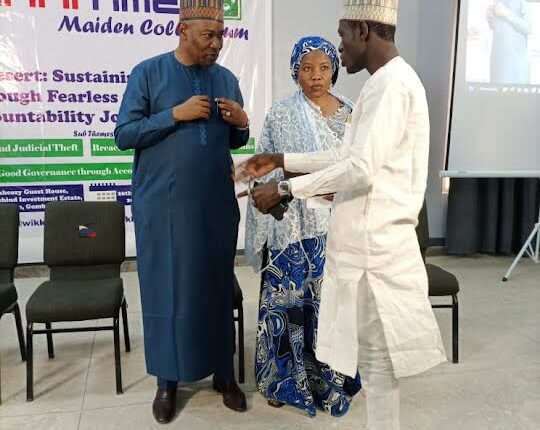By Baba Aminu
Media professionals have underscored the importance of digitizing news content for effective and deeper penetration.
The submission was made during the maiden colloquium organized by the WikkiTimes online newspaper with the theme, Sustaining Democracy Through Fearless Grassroots Accountability Journalism held recently.
This is as the participants charged the news outlets to present their stories in a multimedia format, which it said would help the general public made decisions as to how they want to engage with media content.
This was contained in a communique signed by Haruna Mohammad Salisu, the Publisher and CEO of the Bauchi based news outlet.

They also urged media organizations to dive into the world of collaboration with other news outlets that share the same passion for investigative journalism.
Read Also: Kano records 1,300 sexual, gender violence cases in 10 months – NHRC
SOLACEBASE reports that the communique also admonished media professionals, to not only fulfil their natural calling of holding leaders accountable, but must also strive to effectively inform, educate and mobilize the citizens for national progress and development.
According to the media professionals drawn from different media organizations during the event that was held in Gombe state, said media outlets must not ignore grass-root journalism, noting that local actors at local levels must equally be held accountable.
Founded in 2018, WikkiTimes is an investigative outlet dedicated to holding power to account through fearless reporting.
“WikkiTimes facilitated regional discourse about accountability journalism with wider national implications, in addition to training journalists in the northeast on divergent emerging journalism forms including solution and data-driven journalism,” the communique stated.
“Our accountability journalism takes a deep dive into public procurement, corruption, human rights, criminal justice, environment, health, education, and security”
The event had as keynote speaker Jeff Kelly Lowenstein, Chief Executive Officer and Founder of Center for Collaborative Investigative Journalism, CCIJ and Professor Umaru Pate, Vice-Chancellor Federal University, Kashere Gombe State.
Panelists at the event include CCIJ Africa Editor, Ajibola Amzat; ICIR Editor Victoria Bamas; Chief Lecturer Department of Mass Communication Federal Polytechnic Bauchi, Dr Hamid Adamu Muhammad; Publisher and Editor-In-Chief of Solacebase, Abdulateef Abubakar Jos; Principal Partner S G Idrees and Co, Barrister S.G. Idrees; Editor and Newsroom Mentor, Olajide Adelana and Director Disease Control and Immunization, Bauchi State Primary Health Care Development Agency, Dahiru Ibrahim Mahmood.
Others are Spokesperson to Bauchi Speaker, Abdul Ahmed Burra and General Manager Fombina FM Yola, Garba Dahiru while the event was moderated by Fibi Kafi, news anchor and editor at Bauchi Television Authority and Halima Ibrahim Dimis served as master of ceremony during the event
Participants agreed that the media must “hold leaders accountable and mobilize the citizens for national integration”
“Practicing accountability journalism demands a lot of patience, time and resources. This underscores why journalists who subscribed to this brand of journalism must be fearless, brutal and above all careful with their facts; the terrain does not forgive the simplest of errors or ignorance.”
“The Nigerian media, through their reportage, must not only fulfil their natural calling of holding leaders accountable but must also strive to effectively inform, educate and mobilize the citizens for national progress and development,” the communique argued.”
“Collaboration in accountability journalism is powerful for wider penetration and reach. Media organisations carrying accountability reports must learn to dive into the world of collaboration with other media outlets who share the passion of investigative journalism.”
“For effective and deeper penetration, news outlets must adopt multiple means of disseminating information in view of the changing pattern of media consumption.”
“Stories should be presented in a multimedia format to allow readers to make choices as to how they want to engage with media content; Moreso, because of the idea that audio-visuals summarize and illustrate news stories for easy understanding among readers.”
“Publishers and owners of broadcast stations were also admonished to make deliberate attempts at training and re-training employees to meet up with current changes in ways of reporting and news presentation.”
Speaking further, the experts further postulated that, for the Nigerian democracy to unleash appreciable progress, the media must always be ready to tell truth to power, hold leaders accountable and mobilize the citizens for national integration.



Comments are closed.